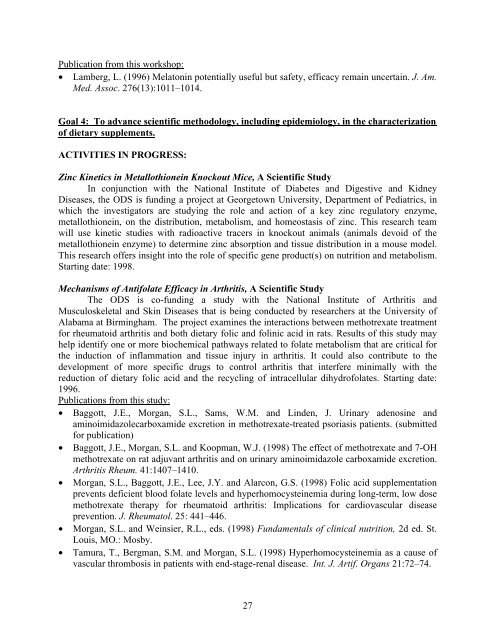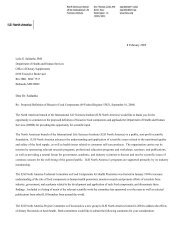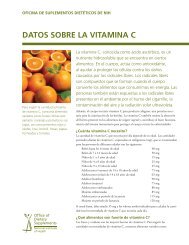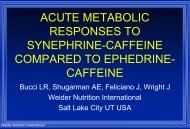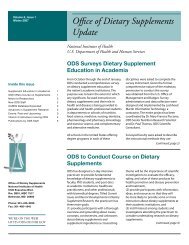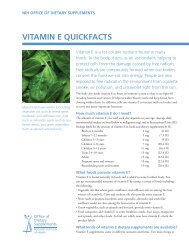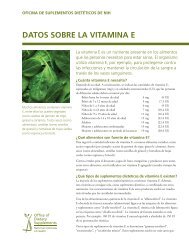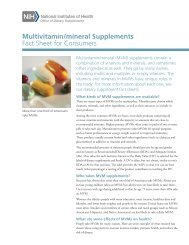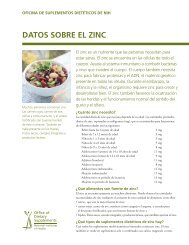status report - Office of Dietary Supplements - National Institutes of ...
status report - Office of Dietary Supplements - National Institutes of ...
status report - Office of Dietary Supplements - National Institutes of ...
You also want an ePaper? Increase the reach of your titles
YUMPU automatically turns print PDFs into web optimized ePapers that Google loves.
Publication from this workshop:<br />
• Lamberg, L. (1996) Melatonin potentially useful but safety, efficacy remain uncertain. J. Am.<br />
Med. Assoc. 276(13):1011–1014.<br />
Goal 4: To advance scientific methodology, including epidemiology, in the characterization<br />
<strong>of</strong> dietary supplements.<br />
ACTIVITIES IN PROGRESS:<br />
Zinc Kinetics in Metallothionein Knockout Mice, A Scientific Study<br />
In conjunction with the <strong>National</strong> Institute <strong>of</strong> Diabetes and Digestive and Kidney<br />
Diseases, the ODS is funding a project at Georgetown University, Department <strong>of</strong> Pediatrics, in<br />
which the investigators are studying the role and action <strong>of</strong> a key zinc regulatory enzyme,<br />
metallothionein, on the distribution, metabolism, and homeostasis <strong>of</strong> zinc. This research team<br />
will use kinetic studies with radioactive tracers in knockout animals (animals devoid <strong>of</strong> the<br />
metallothionein enzyme) to determine zinc absorption and tissue distribution in a mouse model.<br />
This research <strong>of</strong>fers insight into the role <strong>of</strong> specific gene product(s) on nutrition and metabolism.<br />
Starting date: 1998.<br />
Mechanisms <strong>of</strong> Antifolate Efficacy in Arthritis, A Scientific Study<br />
The ODS is co-funding a study with the <strong>National</strong> Institute <strong>of</strong> Arthritis and<br />
Musculoskeletal and Skin Diseases that is being conducted by researchers at the University <strong>of</strong><br />
Alabama at Birmingham. The project examines the interactions between methotrexate treatment<br />
for rheumatoid arthritis and both dietary folic and folinic acid in rats. Results <strong>of</strong> this study may<br />
help identify one or more biochemical pathways related to folate metabolism that are critical for<br />
the induction <strong>of</strong> inflammation and tissue injury in arthritis. It could also contribute to the<br />
development <strong>of</strong> more specific drugs to control arthritis that interfere minimally with the<br />
reduction <strong>of</strong> dietary folic acid and the recycling <strong>of</strong> intracellular dihydr<strong>of</strong>olates. Starting date:<br />
1996.<br />
Publications from this study:<br />
• Baggott, J.E., Morgan, S.L., Sams, W.M. and Linden, J. Urinary adenosine and<br />
aminoimidazolecarboxamide excretion in methotrexate-treated psoriasis patients. (submitted<br />
for publication)<br />
• Baggott, J.E., Morgan, S.L. and Koopman, W.J. (1998) The effect <strong>of</strong> methotrexate and 7-OH<br />
methotrexate on rat adjuvant arthritis and on urinary aminoimidazole carboxamide excretion.<br />
Arthritis Rheum. 41:1407–1410.<br />
• Morgan, S.L., Baggott, J.E., Lee, J.Y. and Alarcon, G.S. (1998) Folic acid supplementation<br />
prevents deficient blood folate levels and hyperhomocysteinemia during long-term, low dose<br />
methotrexate therapy for rheumatoid arthritis: Implications for cardiovascular disease<br />
prevention. J. Rheumatol. 25: 441–446.<br />
• Morgan, S.L. and Weinsier, R.L., eds. (1998) Fundamentals <strong>of</strong> clinical nutrition, 2d ed. St.<br />
Louis, MO.: Mosby.<br />
• Tamura, T., Bergman, S.M. and Morgan, S.L. (1998) Hyperhomocysteinemia as a cause <strong>of</strong><br />
vascular thrombosis in patients with end-stage-renal disease. Int. J. Artif. Organs 21:72–74.<br />
27


